DREDGE
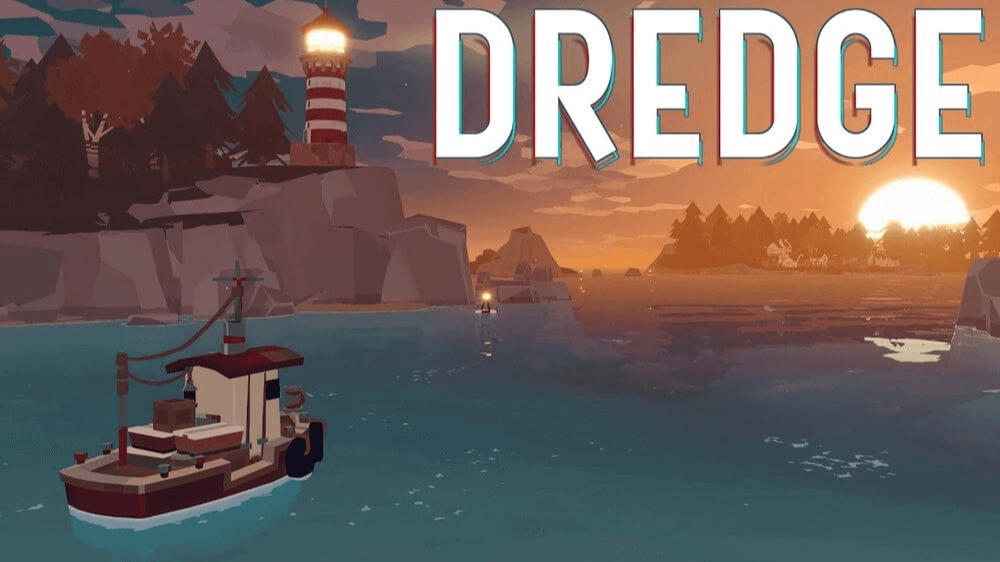
DREDGE - A game with a two-faced atmosphere
The world is full of pastoral games that celebrate the quiet and comfortable life in a rural atmosphere. There are just as many games, where the player is not invited to plow through mossy fields, but to cross the water surface on a tiny yacht. Solitude, oneness with nature and peaceful activities for the soul. It would seem that DREDGE is about all this. It would seem that before us is another attempt to delight a player accustomed to a hurried life with something measured, bringing nostalgia to the heart. But that's not what DREDGE is about...
"...If you're reading these lines, then I'm probably already dead. For years, I struggled with the obsessions that haunted me, both in my dreams and in reality. When the life-saving morphine wore off, the shaky line between the two worlds shook. My mind was confronted with horrors that I would not be able to convey because of my meager vocabulary and the degradation of my mind. It is here. Oh, my God, what a hand...!"
Recognize the syllable? See where the tentacles of DREDGE grow from?
"The Old Man and the Sea" - director's version
DREDGE takes place at the beginning of the twentieth century. The protagonist is an unknown fisherman who is unlucky enough to be in the wrong place, in the wrong place. During another trip out to sea for his catch, the sailor finds himself in trouble: the sea is shrouded in a thick fog. Under zero visibility conditions the sailor gets shipwrecked and miraculously manages to swim ashore. In the small coastal town, the fisherman is greeted by the local mayor and immediately put on the meter. The shrewd mayor proposes an allegedly mutually beneficial deal: we catch the fish, and a percentage of its sale pays for the boat's repair. As soon as the debt is paid, the sailor is free to continue to cooperate, or all part like ships at sea. This is where the adventure begins...
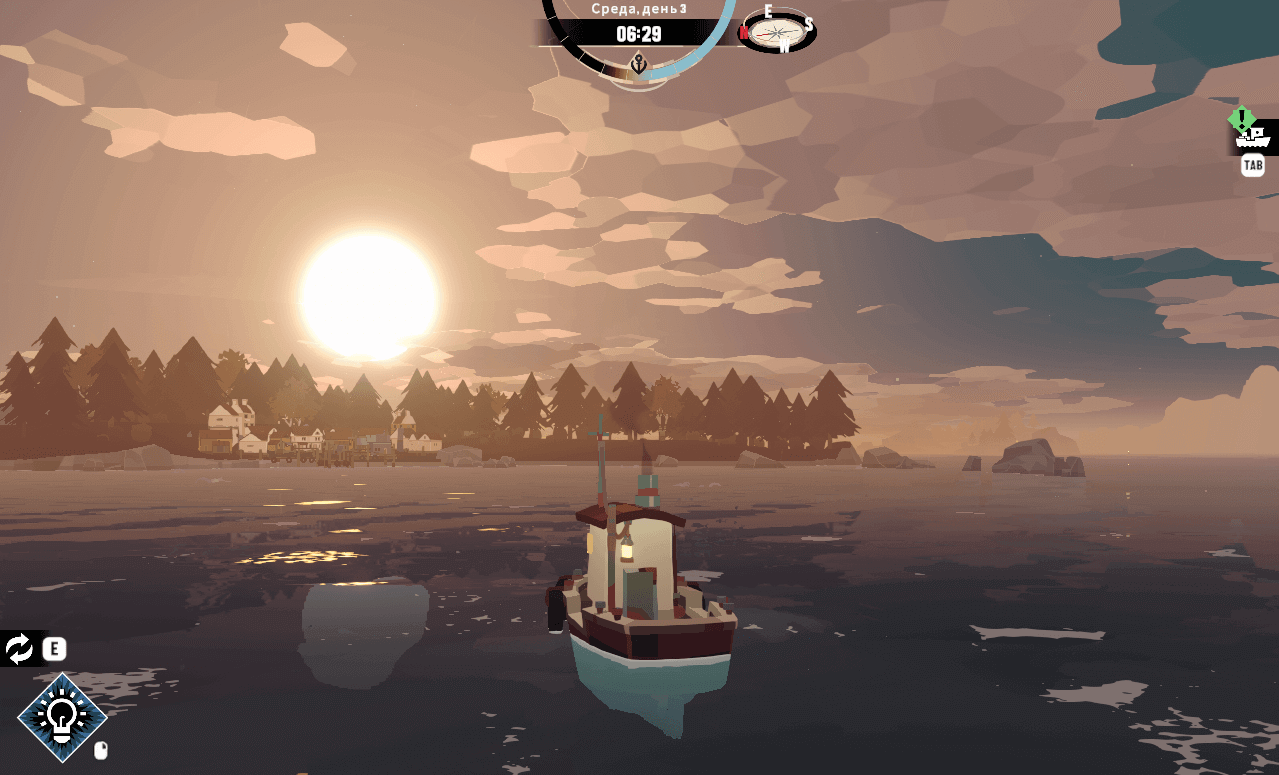
...which is not at all what it might seem at first glance. The fact is that the story in DREDGE is not told through cutscenes, dialogues, or notes. The DREDGE storyline combines all these elements and tells the story in hints. Each inhabitant of the islands has their own stories and opinions about what happened. But the player scurries from island to island, earning improvements to his tiny boat. Only occasionally, as if inadvertently, residents share information.
At first, the DREDGE story seems like something added just for show, and the whole game is perceived as a symbiosis of "Euro Truck Simulator", Tetris and uncomplicated mini-games for children.
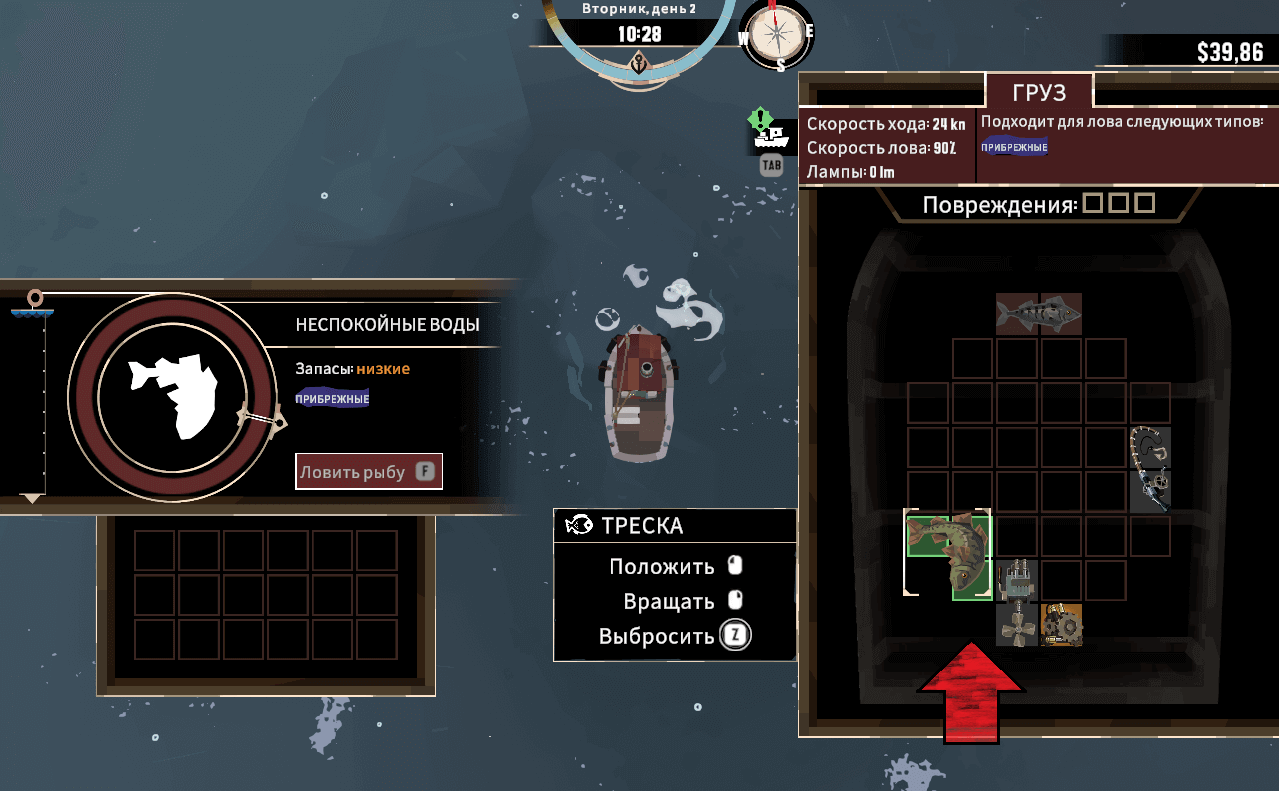
The principle of DREDGE is simple: catch fish with one button to sell the fish. You spend the money to improve the boat to... catch more fish and improve the boat faster. No combat system, deep simulation with dozens of nuances, frills, etc. The DREDGE gameplay is meditative, devoid of dynamics and does not require any special skills from the player.
The moment you catch an unnaturally shaped fish you start to think about a double day. The locals are afraid to say too much to an outsider, and for some reason everyone is afraid of local nights. Sooner or later curiosity will get the upper hand, and then it will turn out that it is not profitable to fish only during the daytime. That's where the fun begins...
Did the Lovecraft parody work?
As much as we would like to avoid analogies, DREDGE is not perceived as a distinctive work. The game forces you to fish at night and take risks. Without night fishing, it's impossible to understand what's going on here. The King of Horror's influences here don't even try to disguise them as the author's ideas. Lovecraft is at the head of DREDGE. The plot, which unfolds gradually and is given out strictly in portions, completely copies the writer's composition. Nothing is said explicitly, but we are clearly given to understand that a curse hangs over the local islands. And, oddly enough, as a horror DREDGE is much better than as a fishing simulator.
During night fishing, the sea is shrouded in a fog in which anything can be found. At least that's what the game wants the player to think.
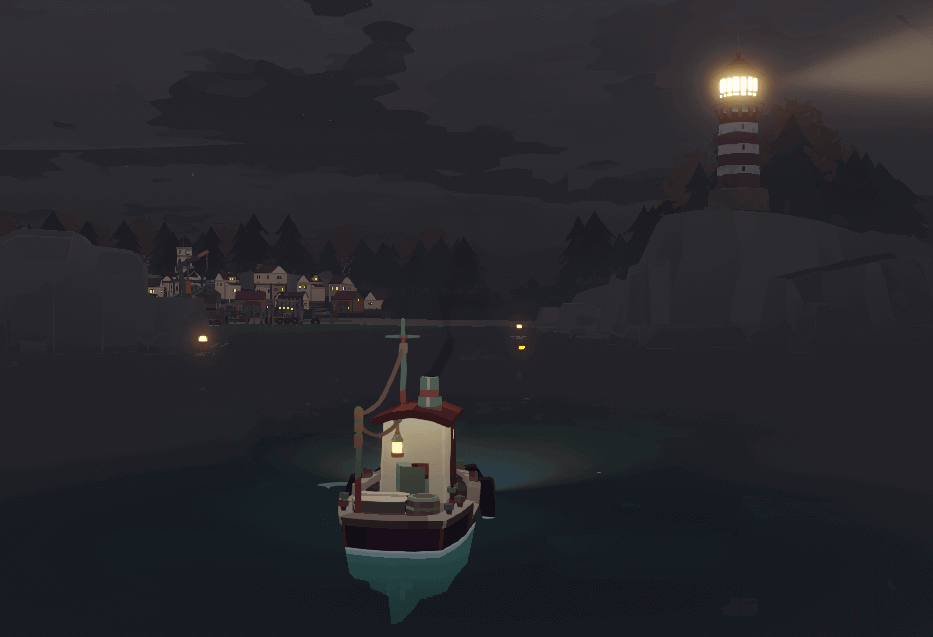
Let's say more: night fishing is the best thing in the game. The procedural generation here is not as poor, so you can meet both unknown creatures and earn more money. In addition, the fish in the seas here are very strange, so gameplay is not limited to mopping up the same fish spawns.
Noticing DREDGE's selling chip isn't easy: 8D sound at night on in-game time. While the sun caresses the waves, DREDGE is an ordinary game, as if written by a student as a term paper. At night, there are artifacts of image and sound in the seas. But the local Cthulhu is in no hurry to plunge the world into chaos, it sleeps and frightens by its mere existence. The game reminds you that the islands are a doomed place: an unknown infection suddenly crawls into the hold, a boat is attacked by a flock of black crows, and the spyglass reveals islands that do not exist. All this is underscored by the soundtrack, which you should definitely get acquainted with in headphones. It's as if Something is constantly breathing down your neck, and the howls of the wind are easily confused with something extraterrestrial.
Of course, a Lovecraftian work could not do without the trademark insanity narratives, DREDGE was no exception. Without sleep, the protagonist gradually goes insane. This mechanic doesn't directly harm the player, but it makes catching fish uncomfortable. The madness of the protagonist makes the game both more complex and more atmospheric: it is very easy to lose touch with reality, get lost or disturb those who should not have been disturbed.
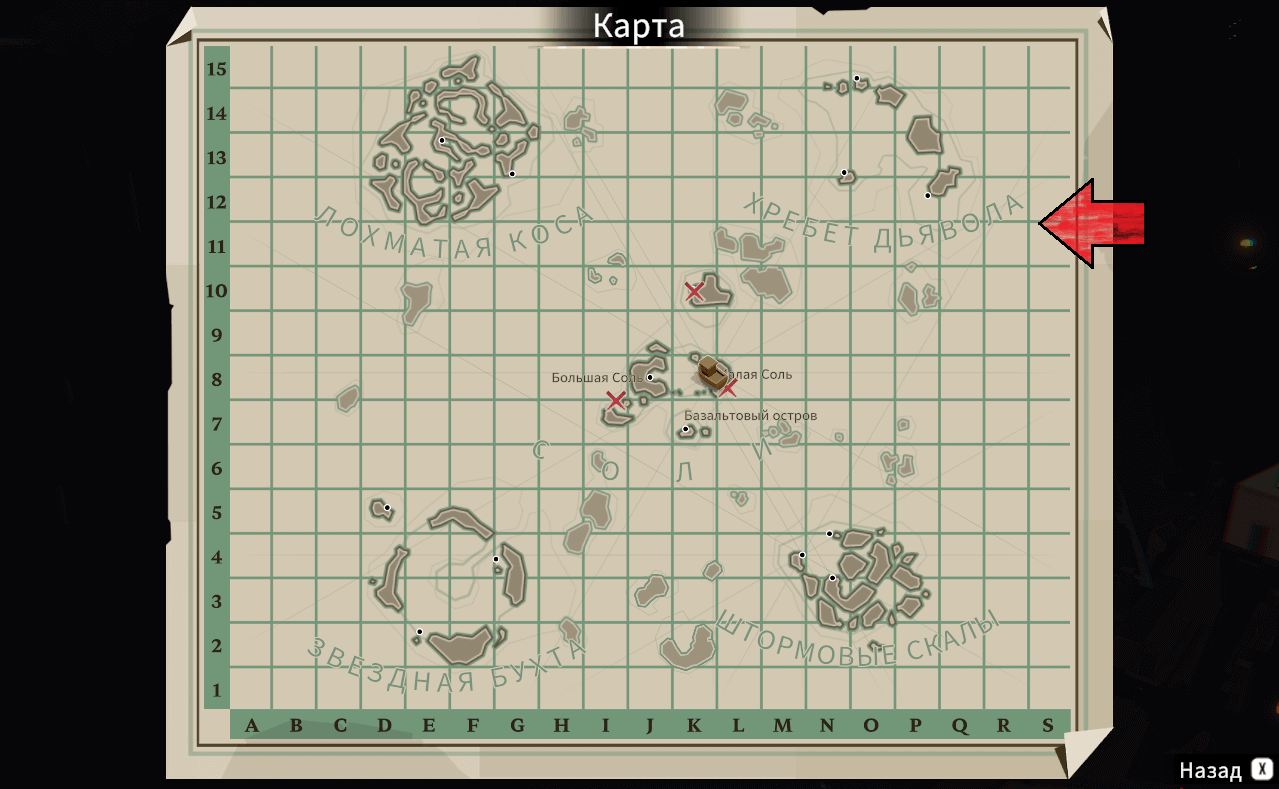
In terms of atmosphere, DREDGE is above reproach. Low-Poly graphics are not as simple as they seem at first glance, weather effects and light play are enough. The water here is not a flat static surface, it feels like a liquid. The only thing missing for full immersion is the mechanics of the tides.
Fishing is not only peaceful, but sometimes boring...
But DREDGE is not without its problems. First of all, the game has too many artificial limitations. From the tiny inventory to the monstrously short daylight hours. The small inventory forces you to go back to town time and time again and sell fish, but not in quantities that make a difference. DREDGE gameplay: sail out of town, catch 4 fish, return to town and make $75. That would be fine, but boat improvements cost a lot more than $75. That is, there is enough grind in the game.
As an alternative to reparative mini-games are side quests, but with them all is not so smooth. Side quests, albeit sometimes containing an important plot detail, are always exhaustively described by the "Fetch, fetch" order of actions.
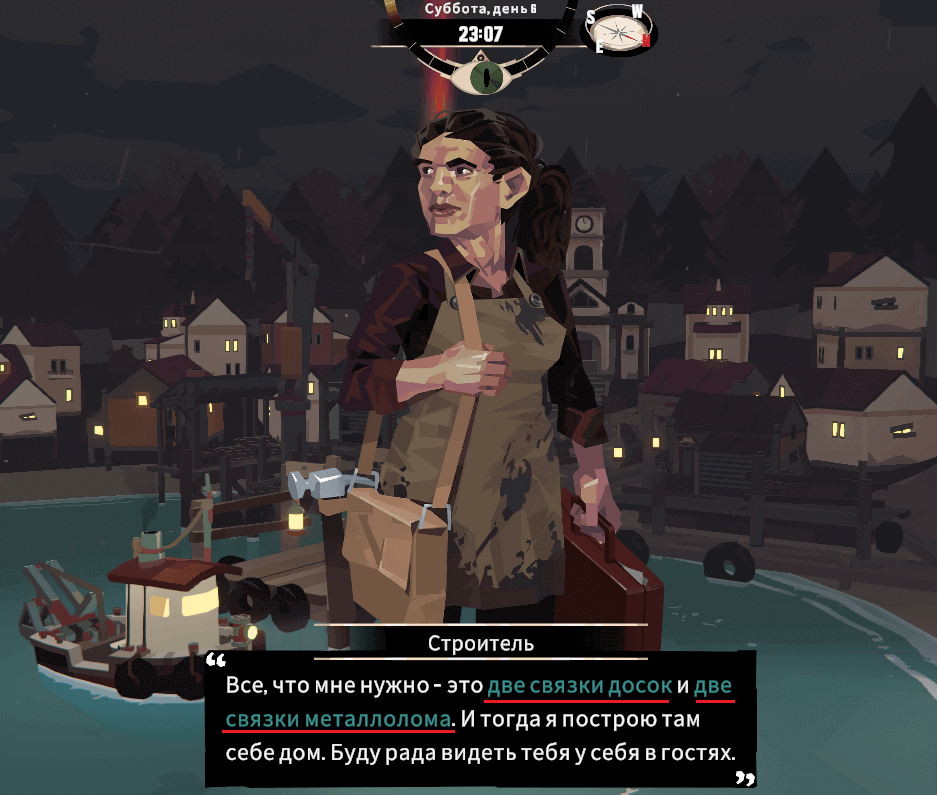
In addition, tasks always exclude each other. That is, while doing one thing, you can't do another one at the same time. This gameplay design mistake is corrected over time with the expansion of the hold, but until then, a lot of water will leak out. One-type secondary tasks would not be a stumbling block if they did not ruin the atmosphere. It's hard to get into a fisherman's skin when you feel like a hamster in a wheel.
Is it worth it to buy DREDGE?
DREDGE is a game with a big soul and a recognizable face. But it is also a game for the mood. If DREDGE were a little more expensive than $3, we could safely recommend it to everyone. However, for an indie game, DREDGE's price tag is average, so it's worth thinking twice before buying. In fact, apart from the atmosphere DREDGE has nothing interesting to offer the player, and for fans of dynamic gameplay - even more so.
